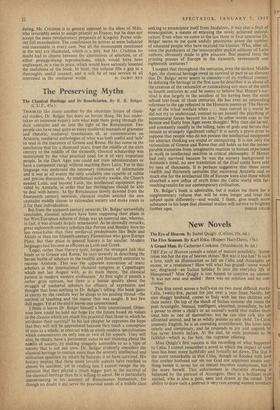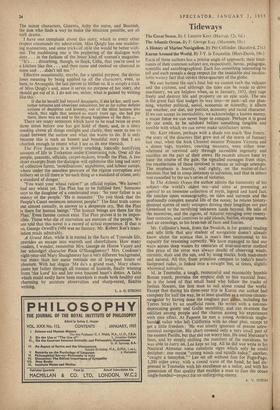New Novels
The Eye of Heaven. By Isabel Quigly. (Collins, '10s. 6d.) THE Eye of Heaven reveals a talent of mature sensibility. 'Some- tidies too hot the eye of heaven shines.' But was it too hot? Is such a love, such an illumination as fell on Celia and Arcangelo an excess, or a revelation? How will what has graced—some would say, disgraced—an Italian holiday fit •into the everyday life of Hampstead? Miss Quigly is too honest to contrive an answer. 'It was not neat and ended : there was no solution and no con- clusion.'
This first novel scores a bull's-eye on two most difficult marks. Celia, twenty-five, parted for just over a year from Neddy, her nice shaggy husband, comes to Italy with her two children and their nanny. On top of the shock of Italian summer she meets the poet Arcangelo. Sensual, intelligent, absorbed, immediate, he has a power to enter a child's or an animal's world that makes them treat him as one of themselves; but he can also sulk like an affronted animal, and be as wildly jealous as any child. To Celia, intensely English, he is an unending astonishment. She loves him, utterly and completely, and he responds in joy and anguish he has never known before. At the end, he even promises to be faithful—which is, for him, the supreme offering. - Miss Quigly's first success is the recording of what happened to Celia. I cannot remember a novel in which the impact of total love has been more faithfully and lyrically set down. The feat IS the more remarkable in that Celia, though so flooded with love that neither husband nor sin nor God nor argument means any- thing beside it, never for an instant becomes anonymous,• but is the more herself. This achievement in character drawing is balanced by the portrait of Arcangelo. Here is a brilliant male animal, who is also a poet, seen and drawn in the round. The ability to draw such a portrait is very rare among women novelists. The minor characters, Ginevra, Ashy the nurse, and Beamish, the don who finds a way to make the situation possible, are all well drawn.
I have one complaint about this story, which in every other respect commands my admiration. Miss Quigly has one madden- ing mannerism, and some tricks of style she would be better with- out. The maddening one is the peppering of the dialogue with dots . . . in the fashion of the lesser kind of women's magazine.
"It's . . . disturbing, though, to think, Celia, that you're used to a kitchen like this .. . and then came and cooked on charcoal in mine and ... didn't tell me." ' Effective occasionally, maybe, for a special purpose, the device loses meaning by being applied -to all the characters, even, as here, to Arcangelo, the last person to blither so. It is simply a trick of Miss Quigly's and, since it serves no purpose of her story, she should get rid of it. I do not see, either, what is gained by writing like this: If she let herself feel beyond Arcangelo, if she let her, until now, rather tortuous and observant conscience, her so far rather definite notions of deception and honesty, out of the strict harness into which, that night that seemed so many years ago, she had put them, there was no end to the strung happiness of the days...
There are many sentences which have to be read twice or even three times before one has got hold of them; and, in a story needing above all things sunlight and clarity, they seem to me to stand between the author and what she wants to do. It is only because this is such an honest and beautiful story that I am churlish enough to resent what I see as its one blemish. The Five Seasons is a slowly crushing, logically horrifying account of life in Turkestan under Communist, rule. Over all the people, peasants, officials, carpet-makers, broals the Plan. A few short excerpts from the.dialogue will epitomise this long sad story of collective farms, 'mobilisations,' expulsions, and labour camps, where under the senseless pressure of the regime corruption and bribery set in till there is 'no such thing as a standard of crime, only a standard of danger.' `You want your wheat ration?' an official replies. 'We haven't had any wheat yet. The Plan has to be fulfilled first.' Someone says to the daughter of a condemned man : `So your father is an enemy of the people.' He is innocent. "Do you think that the People's Court sentences innocent people?' The final truth comes out almost casually, in answer to a desperate cry, 'But the Plan is there for human beings.' 'The human beings are there for the Plan.' Even famine cannot exist. The Plan proves it to be impos- sible. Those who die of starvation are enemies of the people. We are told that this novel is a record of actual experience. U that is so, George Orwell's 1984 was no fantasy. Mr. Robert Kee's trans- lation reads admirably.
A Grand Man, while it is rooted in the facts of Tyneside life, provides an escape into warmth and cheerfulness. How many readers, I wonder, remember Mrs. George de Home Vaizey and her schoolgirl character Pixie O'Shaughnessy? Mrs. Cookson's eight-year-old Mary Shaughnessy has a very different background, but more than her name reminds me of long-past hours of pleasure. With her slogan 'Me da's a grand man,' Mary cham- pions her father through all manner of hazards, finally winning from 'the Lord' his and her own boasted heart's desire. A fable which could easily have been mawkish is made both healthy and charming by accurate observation and sharp•eared, flexible writing.
L. A. G. STRONG















































 Previous page
Previous page